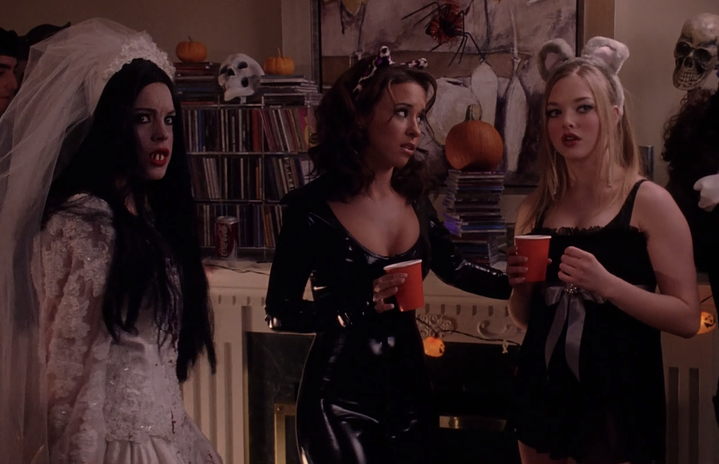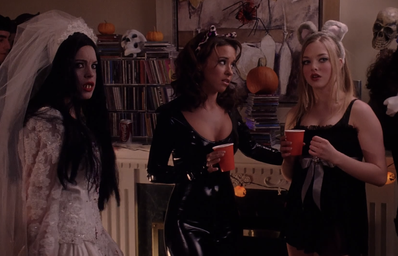When most people think of the 2004 movie, “Mean Girls,” they usually don’t think of feminism. With the release of the new “Mean Girls,” based on the Broadway adaptation, many movie lovers are reminded of the cut-throat social pyramids that dominate high schools. As the name suggests, the women portrayed in the movie are harsh, cold and mean. The high schoolers at Northshore subscribe to an elite social pyramid where the rich, pretty girls, known as “The Plastics,” command the students and the entire high school squabbles at their feet. Most people would contend that this “girl boss” portrayal of women is inherently anti-feminist and condones exclusion, bullying and selfishness. However, “Mean Girls” perfectly encapsulates one of the pioneering theories in feminism: the feminine mystique.
The “feminine mystique,” also referred to as “the problem with no name,” is a term coined by Betty Friedan. Friedan coined the term in 1963 to combat the idea that housewives could only be satisfied in one way. In her book, titled “The Feminine Mystique,” Friedan contends that the feminine mystique is the assumption that women can be solely satisfied with their housework, marriage, sexuality and children. In other words, women who are truly “feminine” do not want to work, receive an education, vote or do anything that will take them out of the domestic space.
“Mean Girls” deals with the desire to be “truly feminine.” The movie, both the original and the musical movie version, highlights the many forms femininity can take. For example, Janice shows a more traditionally masculine form of femininity through her ‘90s inspired goth fashion and her blunt personality. Also significant is Janice’s interest in the visual arts. In contrast, Regina George, the dubbed “queen bee” of the school, rocks pink, high heels and gold jewelry. Regina never talks about her explicit interests apart from fashion, boys and high-school drama.
Although Janice breaks away from the traditional view of femininity, Regina’s power comes from her femininity, and she and the rest of the Plastics weaponize it against others. The Plastics follow strict rules, like wearing pink on Wednesday and only wearing their hair up once a week. In addition, they can only wear pants on Fridays, leaving skirts or dresses as one of the only clothing options. All of these rules are an attempt to maintain their femininity and not appear too masculine. These rules are designed to make them attractive to others, but ultimately they represent an unattainable idea of femininity. At one point, Cady even refers to Regina as, “the Barbie doll she never had.” This unattainable femininity is how the Plastics obtained their popularity in the first place, and it is how they maintain their power.
However, the strict rules they must follow and the pressure they feel to do so causes the Plastics to behave in a mean way. In exchange for popularity, they have to forfeit freedom of expression outside of their beautiful looks. When they first meet Cady, the Plastics make fun of her love of math and refer to joining the Mathletes as “social suicide.” Beauty is a tool for the Plastics and extracurriculars deemed “nerdy,” such as Mathletes, jeopardize this standard of beauty.
While the Plastics are not housewives, the movie emphasizes how women cannot be, and are not typically, satisfied with traditional modes of sexuality and femininity. The feminine mystique debunks the assumption that women will be satisfied in their relationships with men, and similarly, Gretchen and Regina are often dissatisfied with their own relationships and often feel treated like props, rather than people. Gretchen is constantly ignored and invalidated by her boyfriend, Jason. He flirts with other women, which is a major stressor for Gretchen. In addition, Regina appears to be bored in most of her relationships. She only dates Aaron Samuels to get back at Cady, and she only dates Shane Oman as a rebound after her breakup with Aaron and as a way to save her tanking popularity. Initially, the Plastic’s sense of security is through their relationships with men, whom they are dependent on for their self-esteem and sense of identity.
By the end of the movie, the Plastics achieve new happiness by learning to be independent and finding something to be passionate about outside of their looks. During the workshop with Ms. Norbury, the girls of Northshore High deconstruct the social barriers they’ve created within their community. They learn to recognize the humanity in others, and they adopt a “girls support girls” mindset. Many of the cliques dissipate, including the Plastics. Once their social group deteriorates, the Plastics have the opportunity to explore their independent identities and passions. For example, Karen starts participating in the school newspaper and Regina excels at lacrosse.
Ultimately, the Plastics highlight how women are not simple and cannot be characterized through one lens. People’s diverse interests are what make them special, like Cady’s love for math, Janice’s passion for art and Regina’s newfound interest in sports. Moreover, the Plastics do not forgo their interest in beauty–they simply seek to define themselves beyond their looks.
Likewise, there is no dictionary definition of beauty and femininity, and they can present themselves in different ways for individual women. “Mean Girls” is ultimately a feminist film that highlights how women are worthy of independence and the autonomy of self-expression. It reminds the audience that women cannot be boxed into a specific standard or ideal.


